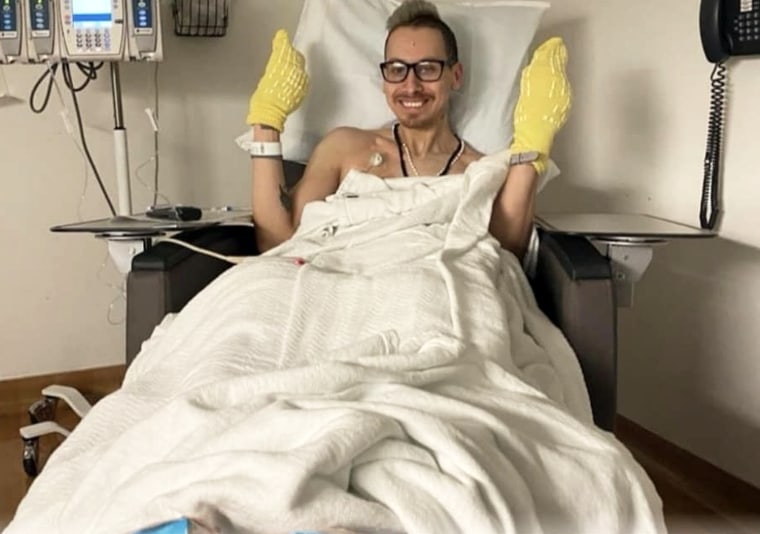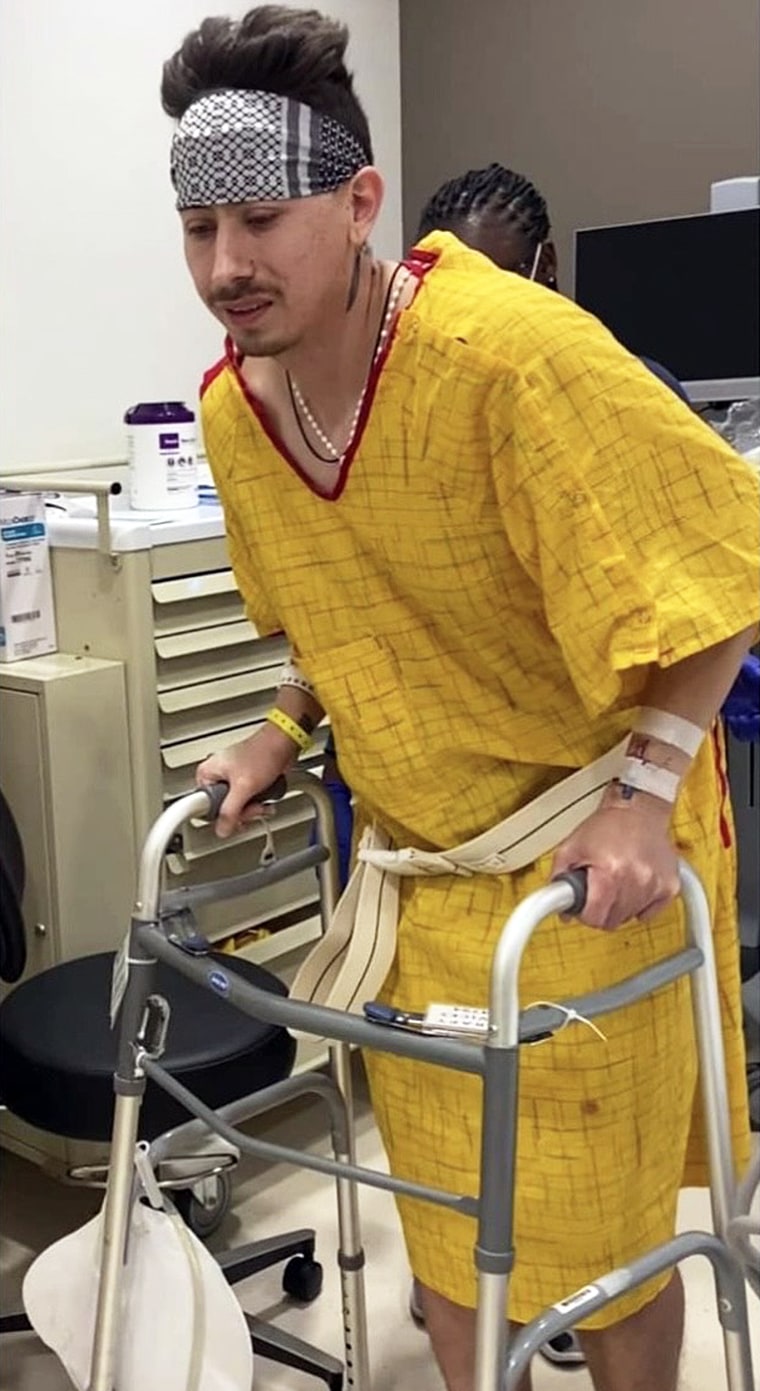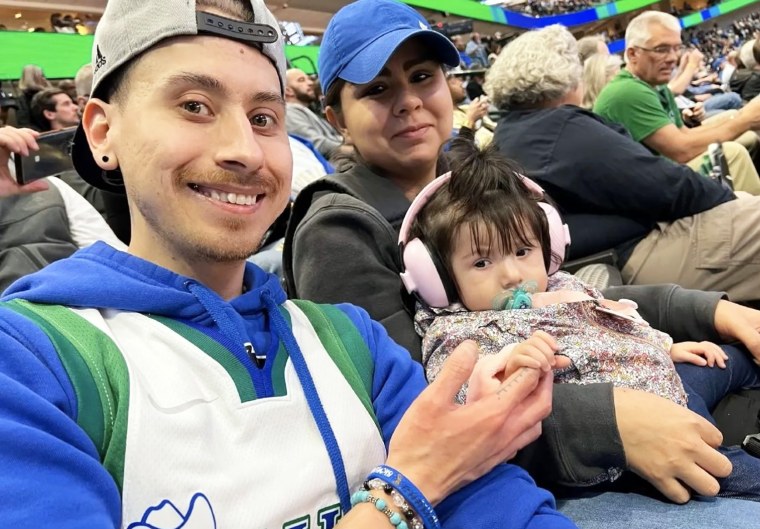Chris Lopez had just come back from a vacation in California when he started to feel stomach cramps he describes as “intense stabbing pain.”
It was the spring of 2019 and the young chef, who lives in Dallas, Texas, assumed it was food poisoning.
His primary care doctor agreed it was probably something he ate on the trip and prescribed antibiotics, but the stomach pain just got worse, Lopez recalls. This went on for almost a month.
“I told my doctor my stomach is feeling worse than before, and I told him I noticed blood in my stool. I was scared because that’s the first time I’ve seen that. … When I went (to the bathroom), I just saw blood,” Lopez, now 35, tells TODAY.com.
“He thought it was maybe a parasite, so he prescribed an anti-parasitic medicine.”

When that drug didn’t work either, many tests and doctor visits followed. Lopez became skinny, losing 60 pounds off his 6-foot frame without changing his exercise or diet routine.
It would take months to discover the actual cause of Lopez’s alarming symptoms: A grapefruit-size tumor in his colon. But because he was only 30 at the time, no one suspected colon cancer.
Finally, a gastroenterologist the chef was referred to ordered a colonoscopy “just to be on the safe side,” Lopez recalls. It was December of 2019, eight months after his stomach pain began. The procedure revealed a 4-inch tumor.
The diagnosis: Stage 3B colon cancer that was metastasizing to nearby lymph nodes, but hadn’t spread to distant sites yet.
'Alarming' rise of colon cancer in younger people
Colorectal cancer used to be thought of as an older person’s disease, but it’s now the No. 1 leading cause of cancer death in men under 50 and the No. 2 cause in younger women, behind breast cancer, according to the American Cancer Society.
“The continuous sharp increase in colorectal cancer in younger Americans is alarming,” said Ahmedin Jemal, Ph.D., senior author of Cancer Statistics 2024, in a statement.
The underlying reasons more younger people are being diagnosed are “not perfectly defined” yet, says oncologist Dr. Christina Annunziata, a senior vice president at the American Cancer Society.
“What is happening there is the big question,” Annunziata tells TODAY.com. “It might be the lifestyle of Americans, whether they have diabetes, their diet choices — colon cancer can be related to obesity, it can be related to smoking, alcohol use.”

People at average risk of colorectal cancer should start regular screening at age 45 with a colonoscopy or a stool-based test that looks for blood in fecal matter, the American Cancer Society advises.
The first blood test to screen for colorectal cancer could be approved this year, NBC News reports. It looks for DNA released by cancerous tumors.
But the No. 1 prevention tool is a colonoscopy because it can help doctors find precancerous spots and remove them before they become cancer, Annunziata says.
There’s not enough data right now to make a recommendation for who under 45 — like Lopez — should have that screening, she adds.
“He shows us that if you’re noticing something that’s persistent, that really is not right in your body, it’s important to self-advocate and really seek other opinions if you feel like you’re not getting the attention initially,” Annunziata advises.
Colon cancer symptoms in younger people
A 2023 study analyzed data from more than 5,000 people who had colorectal cancer before age 50 and found at least one of these “red flag” symptoms tended to show up three months to two years before these younger patients were diagnosed:
- Abdominal pain
- Rectal bleeding
- Diarrhea
- Iron deficiency anemia
Rectal bleeding was more predictive of the disease for younger patients than older ones, the authors noted.
“For younger adults, we really want to raise awareness that, if you have any of these signs or symptoms, don’t wait to see a doctor,” said study co-author Yin Cao, Sc.D, in a statement to the National Cancer Institute.
Start by going to a primary care physician. If the symptoms are persistent and very worrisome, younger patients should self-advocate for an abdominal X-ray or CT scan, and then a colonoscopy, Annunziata says.
‘Why me? I’m so young’
Lopez says he has no family history of colon cancer and genetic tests didn’t show any inherited risk for the disease.
After a colonoscopy revealed the grapefruit-size obstruction in his colon, doctors decided it was too big to operate on. So Lopez underwent chemotherapy and radiation to shrink the tumor first.
He remembers losing faith and falling into a depression during treatment.

“I was just like, why me? I’m so young. I have my whole life ahead of me,” Lopez recalls thinking.
“I would just go to the hospital, go home and I didn’t talk to anybody.”
But little by little, he started feeling better. He finally underwent surgery to remove the tumor in 2021.

Today, Lopez is married, has a 3-year-old daughter and says he’s enjoying life. He undergoes scans and a colonoscopy once a year to monitor for any recurrence.
The chef also spends his time raising awareness about colon cancer. He’s met patients who were diagnosed late and only had a few months to live because they ignored the warning signs.
“If your stomach hurts, get it checked,” Lopez urges others.
“I guess that’s the thing about men. We’re stubborn, we don’t want to go to the doctor because they’ll find something. But it’s always best to get it looked at.”
